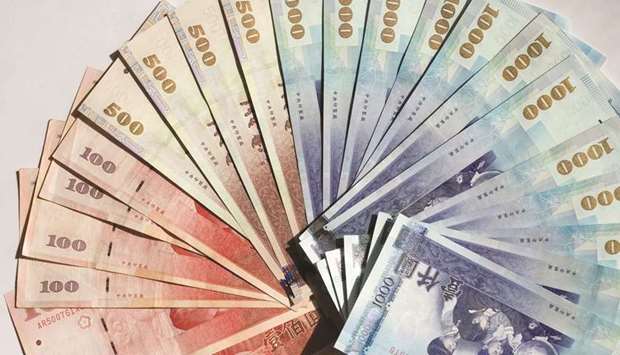Investor sentiment towards Taiwan has rarely been this good, with only days to go before its first presidential election in four years.
Its financial markets keep hitting new milestones: The Taiwan dollar last week strengthened past 30 per greenback for the first time since June 2018, government-bond yields remain near all-time lows and stocks are inching toward a record after their best year in a decade.
While many anticipated Taiwan might get caught in the middle of the US-China trade war, its economy and markets were aided in 2019 by local firms being incentivized to invest at home and there being about $12bn of net inflows to foreign investors’ portfolios through November, according to government data. Fresh proposals to attract investment were announced last week.
“Inflow from both foreign and domestic investors are going to help boost the stock, FX and bond markets in Taiwan,” said Angela Hsieh, a Singapore-based economist at Barclays Plc.
Reasons she cited include investors continuing to take advantage of new tax breaks; as much as 30% of the money repatriated can go into Taiwan’s financial markets.
Meanwhile, with signs of global semiconductors bottoming and equipment related to 5G wireless technology starting to be deployed, “I am positive on Taiwan’s equity market regardless of the upcoming election results” following January 11’s vote, said Vincent Tsui, senior Asia analyst at Gavekal Research.
The Taiex stock benchmark fell 1.3% on Monday, its biggest drop in eight weeks, amid a broad decline in Asian equities.
Overall, though, equities investors have shrugged off Taiwan’s rich valuations, with the price-to-earnings ratio for Taiex components the highest since 2012 on a year-end basis. Money is instead attracted by factors including a 3.8% dividend yield that’s among the world’s highest. Foreigners put a net $9.4bn into Taiwan stocks last year, the most since 2016, according to data compiled by Bloomberg.
Also on the horizon is a strong earnings rebound. Analysts predict a 20% jump for this year, which would be the most since 2014 and more than reverse 2019’s projected 13% profit drop caused by early-year weakness at semiconductor, plastic and panel makers. 5G adoption and Chinese companies diversifying to non-US suppliers should help boost Taiwan firms’ earnings at least through 2021, KGI Securities said in a research note last month.
Then there’s the economy. The government forecasts growth will top 2.5% again this year, stronger than regional peers. Foreign inflows boost Taiwan’s currency from demand to convert overseas cash into local dollars. The Taiwan unit has strengthened versus the US dollar for seven straight weeks, the longest streak since May 2015.
Cash remains plentiful, meanwhile, domestically Taiwan’s markets – particularly from life insurers.
As early redemptions of overseas bonds and debt listed in Taiwan but denominated in mainly greenbacks pick up, Taiwan life insurers may be handed back as much as $44bn this quarter, estimates Fubon Financial Holding Co.
There’s little room for that cash to go overseas as insurers’ international investments are approaching the limit of 65.25% of working capital. The cap exists to reduce foreign-currency risks from overseas holdings.
Bonds are a hallmark of insurers’ investment portfolios globally, and in Taiwan “all the bonds available on the market are mostly snapped up by banks and life insurers,” said Rachel Chang, a bond trader at Capital Securities. She sees that trend continuing for at least the first several months of 2020.
That will keep prices up for bonds. A Bloomberg survey shows expectations that Taiwan’s 10-year government-bond yield may reach a record low of 0.6% by April due to abundant funds available for investment and limited supply of new notes.

Foreign inflows boost Taiwan’s currency from demand to convert overseas cash into local dollars. The Taiwan unit has strengthened versus the US dollar for seven straight weeks, the longest streak since May 2015.
